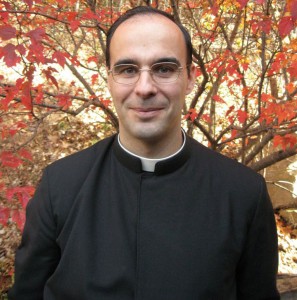Podcast: Play in new window | Download (Duration: 46:05 — 32.0MB) | Embed
Subscribe: Apple Podcasts | Spotify | Amazon Music | Android | Pandora | iHeartRadio | JioSaavn | Podchaser | Gaana | Podcast Index | Email | TuneIn | Deezer | Anghami | RSS | More

“[T]he Church of Christ discovers her ‘bond’ with Judaism by ‘searching into her own mystery.’ The Jewish religion is not ‘extrinsic’ to us, but in a certain way is ‘intrinsic’ to our own religion. With Judaism, therefore, we have a relationship which we do not have with any other religion. You are our dearly beloved brothers and, in a certain way, it could be said that you are our elder brothers. (Pope John Paul II at the Great Synagogue of Rome, April 13, 1986).
For other episodes in this series, visit the Discerning Hearts Sonja Corbitt page
Scripture References for The Show
Luke 1:46-55, the words of the Magnificat
And Mary said:
“My soul magnifies the Lord,
47 and my spirit rejoices in God my Savior,
48 for he has regarded the low estate of his handmaiden.
For behold, henceforth all generations will call me blessed;
49 for he who is mighty has done great things for me,
and holy is his name.
50 And his mercy is on those who fear him
from generation to generation.
51 He has shown strength with his arm,
he has scattered the proud in the imagination of their hearts,
52 he has put down the mighty from their thrones,
and exalted those of low degree;
53 he has filled the hungry with good things,
and the rich he has sent empty away.
54 He has helped his servant Israel,
in remembrance of his mercy,
55 as he spoke to our fathers,
to Abraham and to his posterity for ever.”
The Three Israels
Israel #1 – Jacob
- Genesis 32:22-32, The angel of the Lord changes Jacob’s name to Israel
- Genesis 25-33, Jacob’s story, personification of the nation
Israel #2 – The Jewish Nation
- Genesis 49, the twelve tribes of Israel
- history of the nation
- Matthew 24, the “end of the world” as they knew it at the destruction of the Jewish temple (the center and symbol of Jewish life) in 70 AD
- Romans 11, restoration at the end
Israel #3 – The People of God
- John 8: , Abraham’s children
- Romans 2:28, 29, For he is not a Jew, which is one outwardly; neither is that circumcision, which is outward in the flesh: But he is a Jew, which is one inwardly; and circumcision is that of the heart, in the spirit, and not in the letter; whose praise is not of men, but of God.
- Revelation 19:8, 21:9-10, the Church, the “New Israel” and “New Jerusalem”
- every author of every book of Scripture, except Luke, was Jewish
EPISODE RESOURCES
I Wrestled with God and Won article on Jacob’s confrontation with God at the Jabbok river
Discussion of the significance of Esau selling his birthright is located in chapter three of Unleashed.
Catechism of the Catholic Church (CCC) 63, Israel is the priestly people of God, “called by the name of the LORD”, and “the first to hear the word of God”, the people of “elder brethren” in the faith of Abraham.
CCC 877, In fact, from the beginning of his ministry, the Lord Jesus instituted the Twelve as “the seeds of the new Israel and the beginning of the sacred hierarchy.”
LOVE the Word(TM) is a Bible study method based on Mary’s own practice. This week’s LOVE the Word(TM) exercise is based on a Franciscan* personality approach. Go on! Try it!
Listen (Receive the Word)
“Jesus said to her…’We know what we worship, for salvation is of the Jews’” (Joh 4:22).
Observe (Connect the passage to recent events.)
Find a local synagogue and attend a Sabbath (Shabbat) service, or watch this video. Observe the similarities and differences between what constitutes Sabbath practice for the Jewish people, and what your Sunday liturgy, worship and practice look like. Imagine Jesus observing Sabbath like this!
Verbalize (Pray about your thoughts and emotions.)
Remembering that Mary and Joseph, Jesus, and the apostles were all Jewish, pray for the Jewish people, your “elder brothers” in faith. Offer your thoughts and feelings to God.
Entrust (May it be done to me according to your word!)
Lord Jesus, let Your prayer of unity for Christians become a reality, in Your way. We pray and long for the day when we are one as You and the Father are one. Help us know when and how to cooperate in that unity. Amen
.
*LOVE the Word(TM) exercises, vary weekly according to the four personalities, or “prayer forms,” explored in Prayer and Temperament, by Chester Michael and Marie Norrisey: Ignatian, Augustinian, Franciscan, and Thomistic.

 Dr. Lilles reviews teachings on poverty, humility, and, in particular, friendship, which are all found in a broad overview of the first 18 chapters of “The Way of Perfection.” We also discuss the value of the virtues and the importance of the “good example” in St. Teresa’s writings. All of this will be essential to her foundational teachings on contemplative prayer.
Dr. Lilles reviews teachings on poverty, humility, and, in particular, friendship, which are all found in a broad overview of the first 18 chapters of “The Way of Perfection.” We also discuss the value of the virtues and the importance of the “good example” in St. Teresa’s writings. All of this will be essential to her foundational teachings on contemplative prayer.






 Resources:
Resources: Msgr. Esseff reflects on trusting God in the darkness, the tragedy in Las Vegas 2017, and the need for our understanding of the angels.
Msgr. Esseff reflects on trusting God in the darkness, the tragedy in Las Vegas 2017, and the need for our understanding of the angels.



